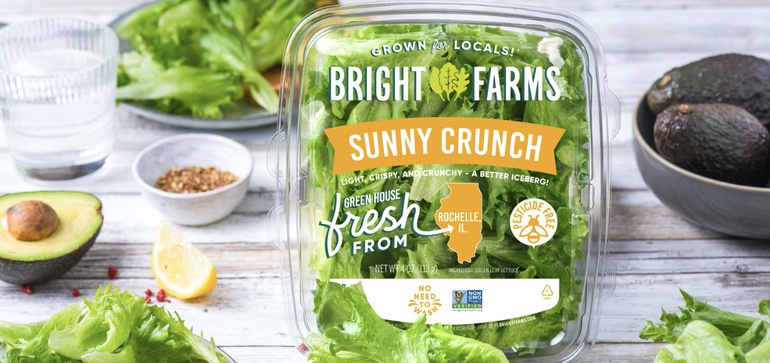BrightFarms recalls packaged salad greens for possible salmonella contamination

Dive Brief:
-
Indoor farming company BrightFarms is voluntarily recalling packaged salad greens produced at its Rochelle, Illinois, greenhouse and sold in Illinois, Indiana, Iowa and Wisconsin due to potential salmonella contamination. The company said it issued the recall “out of an abundance of caution” after being notified that eight consumers became ill, some of whom purchased or consumed the affected products during the month of June. The items include nine products encompassing a dozen UPCs of salad greens with “best by” dates through July 29, 2021.
-
The Food and Drug Administration said that it along with the Centers for Disease Control and state and local authorities are investigating the outbreak and it is working with BrightFarms to determine if other products are affected. The agency confirmed that six people ate or bought multiple types of BrightFarms brand salad products before they got sick, and it was able to identify BrightFarms’ Rochelle facility as the likely source of the items.
-
The recall comes after indoor farming operations emerged as a potential answer to the foodborne illness outbreaks that have plagued the field-grown greens segment during recent years, and only a few months after the industry debuted a food-safety certification program for leafy greens using controlled environment agriculture (CEA).
Dive Insight:
The rapidly growing indoor farming space has been touted as an answer to traditional field agriculture’s food safety risks and resource consumption. BrightFarms claims that its operation uses 80% less water, 90% less land and 95% less shipping fuel compared to traditional agriculture, while yielding 10 times more leafy greens per acre. Due to being grown in a controlled environment, indoor farming operators also claim that they can better control food safety risks like pathogens compared to outdoor-grown produce.
This safety-based differentiation is an important selling point for the indoor farming industry as it attempts to attract consumers. Over the past few years, the field-grown produce industry has battled a number of outbreaks that have rattled public confidence. Most recently, the FDA released a report analyzing a massive salmonella outbreak during 2020 linked to red onions. The agency concluded that contaminated irrigation water for a field where onions were grown was the culprit behind the outbreak, which was the largest reported in the past decade.
Romaine lettuce has also been subject to a series of recalls in recent years. Sales of the lettuce, which is one of the most widely consumed salad greens, suffered after the recalls due to poor public perception of safety measures associated with growing the vegetable. A 2018 E.coli outbreak tied to romaine lettuce sent sales that May plummeting 45% compared to the year prior, according to Nielsen data cited by The Wall Street Journal.
To further bolster its position as an answer to field agriculture’s foodborne illness problem, the CEA Food Safety Coalition (CEA FSC) launched what it describes as the first food safety certification program designed specifically for leafy greens grown indoors. The program is designed to account for the unique operational aspects of indoor farming and the food safety hazards that they pose. The program also offers a neutral, third-party assessment of whether an operation is taking the right approach to preventing potential outbreaks.
The recent recall by BrightFarms, which is a founding member of the CEA FSC, could cast a shadow on whether indoor farming provides the solution to curbing foodborne illness outbreaks involving leafy greens. That said, announcing a voluntary recall may help tamp down consumer backlash related to the outbreak. The move could demonstrate the company’s efforts at preventing and mitigating any risks in lieu of waiting for an enforcement action from the FDA.
Founded in 2011, BrightFarms has been focused on rapid expansion, constructing greenhouses near major markets with an eye towards national reach. The company has indoor farming operations in Illinois, Ohio, Pennsylvania and Virginia, and has three new farms under development in North Carolina, Massachusetts and Texas. It distributes its products to more than 2,000 stores in the U.S. and expects to expand that to more than 15,000 stores by 2025. To fuel its mission, it’s attracted major attention from investors who have poured over $200 million into its operations and recent expansion efforts, including a $100 million funding round this past October.
Source: fooddive.com

